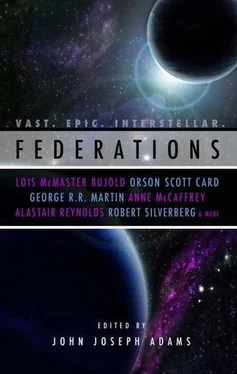I stopped. I stopped talking. I stopped listening. For a few seconds, I stopped breathing. I think my heart was even still. The fruitful discussion we had been having and the excellent progress we had been making immediately ceased. We all just stared at her, not really sure how to react. I sensed that I could lose control of the meeting if I did not act quickly. This was not just a disruption; this was a challenge, a challenge to my very authority. The senior leaders, all wise and gerbunctious, looked at me; after all, she was my employee and it was my meeting. I could have had her ejected immediately, but I did no such thing. I just looked as her and thought for a moment, and then I said, as calmly as I could, “What do you mean?”
“What do I mean?” she asked. She did not look well. She was pale and trembled like a baby limik. Even now I attribute her behavior to some undetected illness, the Regulian flu perhaps. “Just look,” she whispered, “just look at what you are proposing. Just stop for a second and look at it.”
“No,” I said. Obviously the young woman had completely missed my point. Another sign of her illness, I assume. “What do you mean by ‘grimpting?’” I asked. Her eyes widened and she stared at me as if I had spoken in a language she could not comprehend. Two of the leaders at the table smiled at me and one of the adjuncts even laughed, so I seized the opportunity. I leaned towards her, moving as close as I could without leaving my seat. Her breath was hot on my face. “Are you making up words?” I asked. A few more joined the adjunct in laughter. “Are you sure you’re well?” I added.
The young woman turned as red as a glamik and explained that she and her sister had made up “grimpting” as children and that to define it would be difficult. They had, in fact, never defined it; they had merely used it. She looked down at her hands and then she looked at mine. Finally she said, quite seriously I believe, “But whatever the hell it means, I am sure it is entirely appropriate.” The young woman rose from her seat and ran from the room. After the laughter had faded, we composed ourselves and continued our excellent progress.
I must admit, I owe much to that young woman. I cannot remember her name and really do not know whatever happened to her. She was off the station within two hours, and I can assure you she is no longer a terrologist. But that young woman made me keenly aware of language. She made me aware of how easily words can be created, how they can be crafted and used. I have uttered the word “grimpting” (or one of its various forms—grimpts, grimpter, grimptel, grimpted) almost every day since I last saw that young woman. What wonderful words they all are.
• • •
As I look back on the Kolome Project, I realize that it provided many fine words to our language. To avoid wandering into a topic that cannot be easily covered in one short transmission, please allow me to limit my discussion to the words that emerged from my work with that single planet.
I am not sure of how familiar you are with Kolome. I certainly do not remember it coming up in any of our conversations. So please indulge me while I recount a little history. If you need more information, I encourage you to read my early work on the subject: Kolome—When Rumors Meet Truth .
Kolome was the eighth planet outside our solar system we had attempted to settle. A remote planet, Kolome is best remembered for being the first planet we colonized with indigenous life already on it. By the time I was brought onto the project, humans had been living on Kolome for almost two years. Initially there was no plan to terraform Kolome at all. The atmosphere was breathable, and the temperature, although frodeling, was warm enough to sustain human life. Water was scarce, but enough could be extracted from minerals to negate the need to import more. All in all, it was a decently hospitable planet.
The first colonists established one settlement in the north and one far to the south—with “north” and “south” being relative of course. The equatorial region, warm and lush, could have much more easily sustained human life, but the first settlers avoided the region in order not to conflict with the numerous life forms that already thrived there.
For almost two years the colonies survived without any problem, at least nothing more than the usual challenges of settling an alien world. The northern settlement grew to more than seven-thousand inhabitants and showed signs of economic potential. The southern colony, although not quite as prosperous, began to expand to the north. Things seemed to be going very well. Very well indeed, until, inexplicably, one of the indigenous species started to migrate toward the southern pole.
The migrating species was red and long but no wider than the tip of your little finger. They looked like quick ribbons fluttering about close to the ground. Their migration started slowly, no more than a few kilometers a week, but by the time I was summoned the creatures had come within fifty kilometers of the southern settlement’s primary base. They did not seem particularly aggressive, and the colonists initially assessed them to be quite harmless. Unfortunately, initial assessments are frequently wrong.
As the creatures neared one of our outposts, many colonists there grew ill. It started with a few isolated cases of fever and hallucinations. The doctors on Kolome initially thought they could contain the disease, but it rapidly spread into an epidemic, incapacitating the entire southern settlement. Most patients recovered after a few days. For some the illness lingered for weeks. For a few, but far, far too many, the disease proved fatal.
At first the colonists did not draw a connection between the illness and the migrating species. They initially thought the symptoms might be a delayed reaction to one of the native plant-like species the colonists fed upon. The food had been thoroughly tested years before but was studied again and found to be quite harmless, as initially assessed. The finest physicians in that part of the galaxy were brought in, but none of them could cure the disease or even determine its cause. In the end we could only assume the illness had something to do with the migration of the little red creatures. By the time I arrived, almost two-hundred colonists in the south had perished. There was talk of abandoning the settlement. Some even proposed leaving Kolome altogether.
I will not go into the details of how we resolved the problem, for that is not my purpose here. I fear I have already digressed. I will try to restrict myself to the subject at hand, the words which arose from my work on the Kolome Project.
I must admit that I saw the little creatures only once, and that was during a brief excursion to Kolome’s surface. I had traveled over a hundred kilometers north of the southern settlement. Some of the colonists had encouraged me to take a faclicant to help me properly assess the situation. As it is, on this excursion, I preferred to travel as one, trusting my instincts. An ancient philosopher once said, “When a man is alone, he is alone.”
Truth is truth, and I must admit I have never felt so isolated, even with the settlement only ten minutes away by galaride. While I surveyed what I can only describe as a hopelessly barren landscape, one of the creatures came flitting by, alternately displaying its crimson back and its underside flecked with orange and yellow. As the creature passed within half-a-ten meters, I heard it make a high-pitched singing sound. The first colonists, understandably entranced with the creatures, had named them “trillbrights.”
As I watched the trillbright dance over that desolate landscape, I realized the challenge I faced, the problems that lay before me. The creature was, as I had feared, quite beautiful, more beautiful than the holopics could ever portray.
Читать дальше












